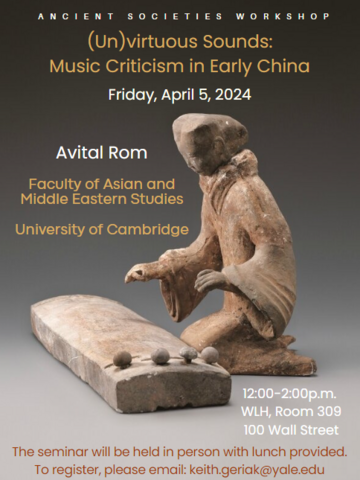“(Un)virtuous Sounds: Music Criticism in Early China”
Avital Rom
University of Cambridge
The Xunzi 荀子 (compiled ca. 3rd century BCE) famously proclaims that “Music unites that which is the same (yue he tong 樂合同). In this talk I shall argue, however, that this creation of a music-based “same” – a music-based “self” – in pre-Han and Han texts, necessarily yielded the creation of a music-based “other,” namely any individual or group who deviated from this unifying, “correct” musical conduct. Drawing on case studies from primary sources, I will conduct an analysis of what can be termed “early Chinese music criticism” and the ideological and terminological trends that underlay it.
For early Chinese thinkers, music often served as a rhetorical tool by means of which they could instil a distinct sense of cultural and moral identity amongst their audiences. The act of critiquing music and deeming it “good” or “bad” was no less political than it was aesthetical. The moral dimension of a composition (also described as a compositions virtue, de 德) was essential in distinguishing patterns of sound (yin 音) from proper Music (yue 樂). Furthermore, the conduct of an individual was judged, amongst other things, by their taste in music and usage of it. Fondness of “New Music” (xin yue 新樂), or any musical conduct that departed from the tradition, be it historical or invented, indicated bad manner. Discussing these and other key elements appearing in early Chinese music critiques, I argue that the period of China’s unification saw Chinese music criticism rise, flourish, and develop its own unique features.
